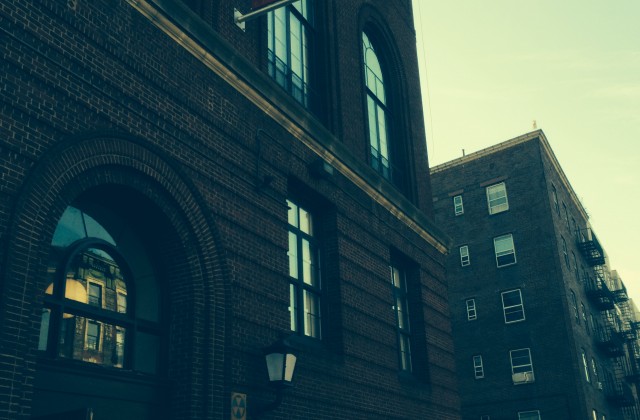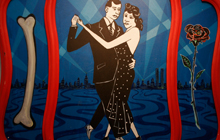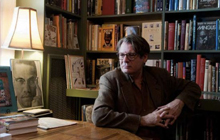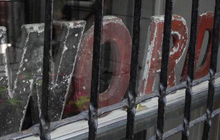The Book Problem, Pt. 2
03.18.14
Mayor Bill de Blasio, City Hall, New York, NY 10007
To: Mayor Bill De Blasio. cc: Scott Stringer, Jimmy Van Bramer, Anthony Marx, Vianella Rivas.
Dear Mayor De Blasio,
As you’re undoubtedly aware, the first plaque bearing your name on the city’s landscape is on the Washington Heights branch of the New York Public Library. Reflecting the previous administration’s agenda of irresponsible oversight, spending, and defenseless reconstruction for Uptown’s gentrification, the library has renovated away the community’s future and buried its past. People aren’t stupid. People here are aghast. Everyone on the street’s asking the same question. Where are the books? The ceilings are tall and the walls are white, giving the effect of being in an art-less gallery, and almost entirely without books. “When we were let back into the building we were taken aback at finding out we had less shelf space than we had when we closed.” I won’t attribute the quote to the attendant at the Library, as I don’t believe it will further his career.
His employers have addressed the problem of books but books are not a problem. People who don’t read them are. Despite the local politicians and library developers’ self-congratulatory lip service to the contrary at the opening ceremonies, this is not their community’s library but anybody’s library. It is aimed at nobody in particular from anywhere and delivers the same. This is a library without books for people who don’t read in a neighborhood with some of the lowest literacy numbers in America, where, since the introduction of the Internet, literacy is degenerating at a pace in sync with We the People’s quality of life and liberty.
There is no selection of books here representing the neighborhood of this Washington Heights/Harlem “library” anymore than these politicians do. The library is one block from the Morris-Jumel Mansion, the oldest residential building in Manhattan and George Washington’s headquarters for the Battle of Harlem Heights, which some historians refer to as “the psychological turning point of the American Revolution for Independence.” It was also home to Eliza Jumel, antebellum America’s most liberated and wealthiest woman; a Harlem feminist Horacio Alger story like nobody’s business. It is the same house Duke Ellington called “The Crown of Sugar Hill”, birthplace of the Civil Rights movement, and home of jazz royalty. Malcolm was assassinated at the Audubon Ballroom five blocks north. The Black Arts Movement was born here. Baseball started at the Polo Grounds, now the Polo House projects, two blocks away.
I’m frequently told by neighbors, regards the Morris-Jumel Mansion, “White people live there” and that they’ve never ventured into the park or house, presuming they’re not welcome there. There is no local history collection here for them to answer questions about the Who, What, When, Where, Why and How of Here. Locally schooled children and adults are schooled in none of the above and there is no evidence of it having happened here at the library. Four years and $12.4 million dollars later our library’s been stripped of Uptown’s story. You are at the library where those books aren’t. If inquiring minds want to know about any of that, they can look it up on the Internet; yesterday’s technology today.
What books are still here are out of the way, down low, and peripheralized. The NYPL architects and design planners seemed to think books were a problem they could solve. They presented a problem, not unlike the problem the people of this neighborhood present to its gentrifiers, who’d like Uptown to be more like Downtown. A library that is not about books, over a year overdue, sufficient time for a generation of Washington Heights kids not to have used a library. And over budget, a 4-year renovation that cost $12.4 million, none of which seems to have gone for books.
They have renovated away the books and replaced our library with an Internet hub with comfortable seating, not unlike a JetBlue terminal’s departure gate to the Brave New World. Quite a departure. There are lots of internet terminals here and “I’m sure you’ll find something there” is a direction the librarians in attendance will be wearing out, along with “I could order that for you”, as the books aren’t here. Librarians or flight attendants? “Those aren’t librarians working there,” I’ve heard. You won’t hear “Let me show you a book.” There won’t be that experience of your fiend and/or librarian taking you back in the stacks and showing you what you’re looking for, surrounded, Dewey Decimal style, by what you didn’t know enough to know what to ask for, and that magic moment happens and you find out what you didn’t know you needed to know.
As a New York City rare book dealer to its effete elite for the past 40 years I’ve had a unique perspective on the change of consciousness responsible for the consequences of Post-Literacy resonating through our Culture. From my first job at the Strand to my being Mrs. Vincent Astor’s private librarian it’s been a front row seat to watch the demise of print autonomies (liberal humanism, for instance) we’ve grown accustomed to being defaced, increasingly calloused to an epidemic of ignorance that threatens civil and human rights.
This is not the way we want things to go in New York City. Nobody wants to admit to the debacle of a library that’s lost sight of its mission but that needs addressing in Washington Heights: who and what did we pay for this travesty? why did it take so long? and where are the books and why aren’t they here where they’ll do some good? Towards keeping your name clean, I’d ask you to include our library in Scott Stringer and Jimmy Van Bramer’s examination of the NYPL’s spending practices and to extend your investigation into our branch.
If I can be of any assistance in any way, I am at your service.
All amities,
Kurt Thometz


 Jumel Terrace B&B
Jumel Terrace B&B Life Turns Man Up & Down
Life Turns Man Up & Down The Private Library
The Private Library
“The great man loves the conversation or the book that convicts him, not that which soothes him or flatters him. He makes himself of no reputation; he conceals his learning, conceals his charity.” –in this case politicians, like they have for centuries, sought flattery not enlightment. (Quote from Ralph Waldo Emmerson)